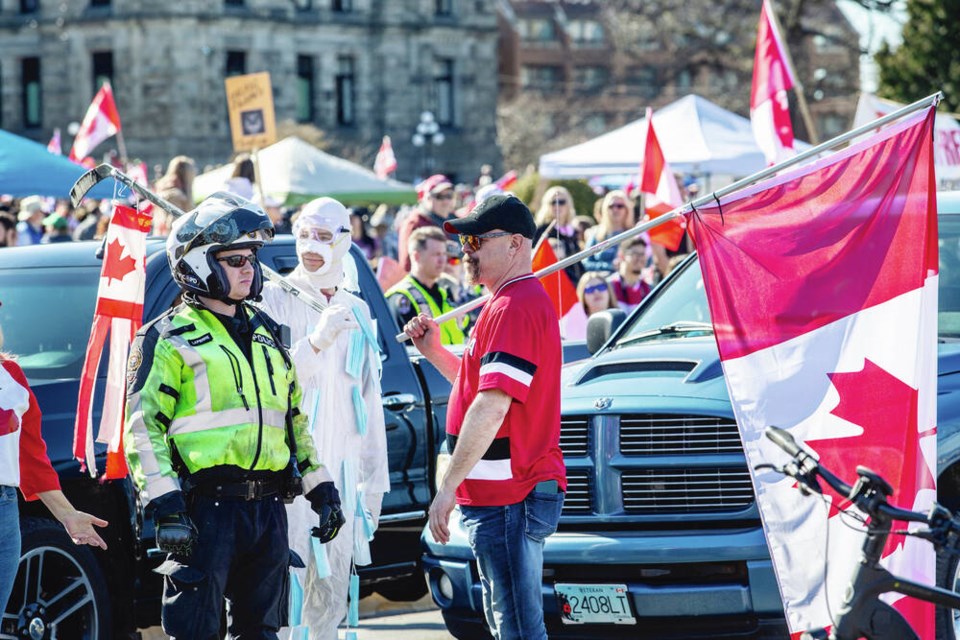For the past two Sundays, I have joined thousands of others in rallies to stand with Ukraine, support the Ukrainian people and condemn the war criminal in the Kremlin.
And on both occasions, we have also seen members of the “freedom convoys,” the people protesting vaccines, masks and other mandates. (I won’t call them truckers — that would blacken the name of the vast majority of truckers who have paid attention to the science, understand their social responsibility and have been respectful of the law.)
So I have been musing on these very different aspects of “freedom.” On the one hand, the freedom of the Ukrainian people from war, invasion and true tyranny; on the other, freedom from “being asked to wear a piece of paper over their nose and mouth to protect others,” as Dee Snider, former frontman of the heavy-metal band Twisted Sister, recently put it.
In the 1980s, he wrote a song, We’re Not Gonna Take It, that has recently become a resistance anthem for the Ukrainians. But it has also been used by anti-maskers. Mr. Snider approved of the former using his song, but not the latter.
When asked why, he tweeted: “Well, one use is for a righteous battle against oppression; the other is infantile feet stomping against an inconvenience.”
In a recent interview on CBC Radio’s As it Happens, he elaborated: “One group are fighting for their lives against oppression and tyranny for real. It’s a life and death situation.” The other group, as I already noted, is upset about wearing masks. “It’s just so ludicrous,” he added.
From a public-health perspective, I find it useful to distinguish between what might be called healthy and unhealthy freedom. Healthy freedom enables people to fulfil their potential, to flourish. It includes freedom from hunger, fear and, of course, war.
But it is rooted in a sense of community. It recognizes that one has an obligation to protect the freedom, lives, health and safety of others — and not just others in one’s own family and community, but in humanity as a whole.
Thus, it is a constrained freedom, linking freedom with duty, responsibility and obligation.
Healthy freedom is not absolute. You do not have the right to harm me, and as a society we have a duty to protect people from the harmful activities of others.
You can’t drive on the left because you feel like it. You can’t drive while drunk or ignore stop signs and red lights. Your freedom to smoke, we used to argue, stops at my nose. Or more relevant today, your freedom to make noise stops at my ear.
Unhealthy freedom is when people feel they are free to act in ways that harm others. At its simplest, you are not free to kill others. It is against all moral codes and laws, although there are clearly exceptions even to that: legitimate defensive war, self-defence and, where it still exists, legally sanctioned executions.
And you don’t have the right to endanger others by ignoring mandates for mask-wearing, vaccine passports or immunization.
Society, in the shape of public health officials and governments, have put these restrictions in place because, based on what is known, they are likely to protect the majority of the population, especially the more vulnerable members of society.
Where possible, there have to be reasonable accommodations, and nobody wants to restrict freedom any more or for any longer than is deemed necessary. However, freedom is not absolute; there are reasonable limits in a democratic society.
These two sorts of freedom are about to be vividly contrasted in Victoria, it seems. According to a March 7 news story, a “freedom convoy” is on its way to Victoria from Thunder Bay.
The story quotes James Bauder, one of the organizers of the Ottawa occupation, as saying “We’re coming to defend your lawful freedom of choice,” and adding: “We’re going to be occupying that area for two to three months” because the NDP and Liberals have “had their way for too long.”
Sound disturbingly familiar? This is the same arrogant and shameful rationale behind Putin’s criminal invasion of Ukraine. We can do without that sort of “freedom” being imposed on us.
Dr. Trevor Hancock is a retired professor and senior scholar at the University of Victoria’s School of Public Health and Social Policy.



